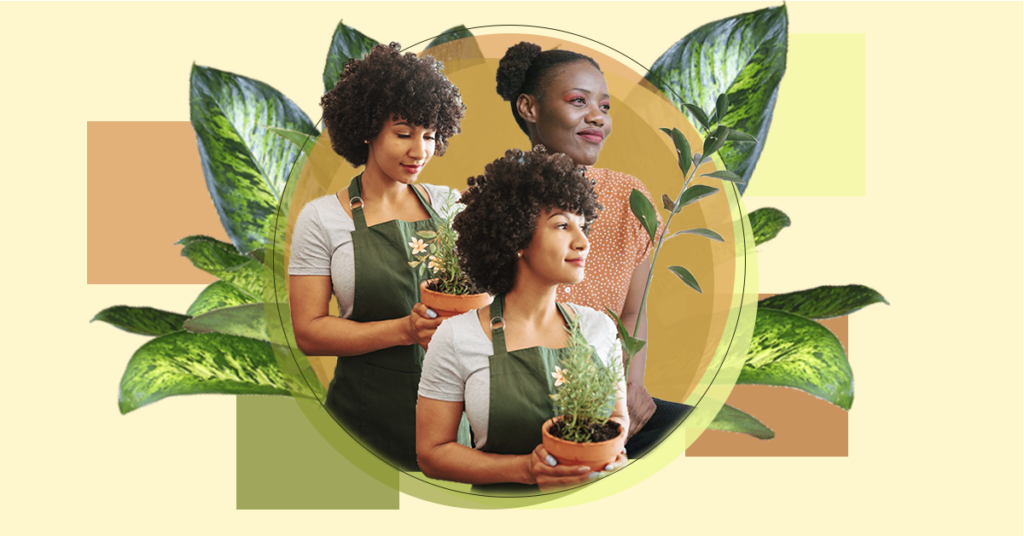Lifestyle | September 10th, 2020
The Influence of Plant Cultivation in the Black Community
By: Akilah Winters

A sea of plants sits in a tiny apartment waiting to be watered and cared for by their parents. The plants often have different homes around the apartment to accommodate to their standard of living. When they are ready to grow, they greet a new pot and a new place to stay. This has become a constant process of plant cultivation in the homes of belonging to the Black community.
There has been a recent trend on social media of many Black influencers and socialites posing with plants. They call themselves plant parents, a title reserved for those who find joy in the responsibility of nurturing a plant. Many new plant parents were raised and grew up in environments in which plants and growing food were seen as important life skills.
In the Black community, this trend is rooted in the work of their ancestors, who were forced into labor with the sharecropping industry. Many plant parents take pride in knowing they are continuing the work of their forefathers.
“There is beauty in knowing that my ancestors, who worked in sugar cane and cotton fields on this island, would be cheering me on as I choose to learn about what they were forced into and making a negative into a positive,” said Shari Watson. Watson is a high school teacher who currently resides in Barbados and is a plant parent who shares her journey via social media.
Instagram of Shari Watson, plant mom and influencer
For many, an adoration for plants was witnessed in their immediate family members growing up and has long been a part of their lineage.
“I have always been surrounded by nature as my father is the king gardener in our family. He has always grown food and kept a beautiful garden full of tropical plants, flowers and trees,” said Watson.
Brittney Parish, a full-time entrepreneur from San Antonio, Texas and a plant parent influencer on Instagram, took her knack for plants from her grandmother.
“My love for nurturing plants started with my grandmother. She had an amazing garden. She even has two huge apple trees that reached the sky,” said Parrish. “She instilled that [plant nurturing] in me, so as I got older I did not have a garden, but I always loved plants.”
Instagram of Brittney Parish, plant parent and influencer
The Black culture has always been influential and driven the trends. Even though most events or activities that become trendy have already existed and are simply given their glory with social media.
“With everything going on with Black Lives Matter and for our culture, a lot of things we have already been doing became more prominent,” said Parrish. “We are a strong culture and people underestimate us; we are already powerful and are influential. Black people have always played a role in raising the plant community and the industry.”
Taking care of plants is also a learning experience that shows that failure is something to gain knowledge from.
“It means being vulnerable enough to take the time to experience the journey of helping something grow while learning. You can’t possibly understand it all at once or get it right every time,” said Watson. “It teaches you how to lose gracefully and fail forward. So every time you try again, you get better and better.”
The coronavirus pandemic has taken a toll on many people’s daily life and mental health. Especially for these two plant parents, the pandemic might have put a strain on their lives, but they used their plants to help them.
“When COVID hit I was unable to travel and I began to enter some tough times, I was hitting a super low point. People usually know me as a super positive person, but I was not feeling positive anymore. I was unsure if it was my cup that needed to be filled, so I began to start looking into plants,” said Parrish. “The plant community saved me. I found myself having over 100 plants in two months and I began to become an influencer. It was very therapeutic and has become a part of my self-care routine.”
The Black community, whose origins are heavily concentrated in the rural South, is also accustomed to cultivating their land for their sustenance. Growing your food through plant cultivation can be very beneficial economically when you provide your food source.
“There is a sense of peace and peacefulness knowing that you will have your own source of food and will have something to feed yourself with. You and your family will never grow hungry and you can save money. With growing, or planting at home, you can share this knowledge with your family,” said the Vice President of the Florida Black Farmers Association Dr. Latresia Wilson.
Growing and nurturing any type of crop or plant comes with much work, love and care but for the Black community, plant cultivation means continuing a longstanding legacy. For them, nurturing plants, gardens and farms is a cost-effective lifestyle, a mentally stimulating connection with nature and an abundance of new learning experiences despite the tedious process.






